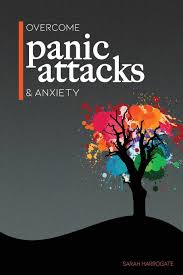What are some anxiety books best sellers? What books can I read to overcome anxiety and live a more content life? These could be some of the questions you may be asking yourself. Know that you are not alone as there are several individuals trying to cope with anxiety disorders everyday. It is a common mental illness in U.S. impacting 40 million adults each year.
Undoubtedly, having anxiety can be a demanding, painful, and an isolating experience, but if there’s any positive take from years of rise in reported anxiety and depression, it is that there is an increasing number of great writing on the subject. Certainly, self-help books are not an instant cure or replacement for treatment but these books can offer invaluable insight and recommend effective techniques for improving your mind-set. Below you will find 9 anxiety books best sellers that you or an anxious person you know might find informative and even life changing.
1. The Anxiety and Phobia Workbook by Edmund J. Bourne PhD
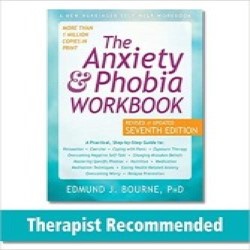
The revised and seventh edition by Edmund J. Bourne PhD is an evidence based workbook containing a broad array of coping skills to deal with different anxiety disorders and panic attacks. It is one of those books recommended by therapists worldwide for individuals battling anxiety and phobias. The workbook consists of the utmost effective skills for evaluating and treating anxiety, you will find a great deal of tools for calming anxiety, ways of putting a stop to negative-self talk and learning to take command of your anxious thoughts. It also includes:
- Techniques for relaxation and breathing
- Fresh research on exposure therapy to manage phobias
- Useful tips on mindfulness, nutrition, exercise and lifestyle changes which will impact anxiety
The Anxiety and Phobia Workbook has been written by an expert in cognitive behavioural therapy (CBT) field with the latest clinical research which intend demonstrates the books credibility. In a phased manner, the workbook outlines treatment approaches for agoraphobia, panic disorders, obsessive-compulsive disorder (OCD), generalized anxiety disorder (GAD), worry, post-traumatic stress disorder (PTSD), and fear. In addition, this revised version also has new information on avoiding relapse after effective treatment and recent updates on medication and more.
The workbook can be used on its own or in conjunction with therapy. What is most appreciated is the how comprehensive the workbook is and assists a great deal in getting you back in control of your life. The Anxiety and Phobia Workbook is a great resource for the spouses, family or friends of people who experience anxiety as they too can gain an understanding of the disorder and learn how they can be supportive during periods of heightened anxiety or panic attacks.
2. Dare: The New Way to End Anxiety and Stop Panic Attacks Fast by Barry McDonagh
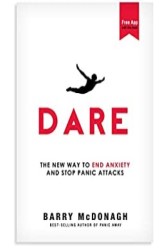
This is a comprehensive guide for individuals who think that life without anxiety and panic attacks is impossible. The author bases the book on science and his personal experience in assisting anxiety sufferers, revealing his utmost effective technique called DARE. The tools, factual information, exemplary scenarios and thorough explanations in this book are simple and indeed motivational as it inspires you to take the step and change your life.
In this comprehensive anxiety guide you will learn:
- Tools to help put a stop to panic attacks and feelings of general anxiety
- To face any anxious situations which you could be avoiding
- To cease anxious or intrusive thoughts
- To use the appropriate supplements for anxiety relieve
- Enhance your confidence and boost self esteem
- Tips to be free of anxiety to get a good night’s sleep
The book also comes with additional resources, like access details to App for your smartphone together with four audios for anxiety relief.
3. Hardcore Self Help: F**k Anxiety by Robert Duff Ph.D
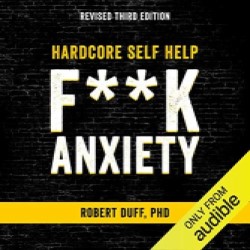
This is certainly not the traditional self-help book and is likely not for everyone. However if you like honest hard truth, straightforward advise and don’t mind some strong language then this anxiety book will be great for you. The author talks more like a friend or a fellow mate who also suffers from anxiety. Not only does this book provide coping mechanisms but makes you feel like you have someone to talk to.
The material is not exactly brand new as there are other anxiety books with same coverage, but what makes this anxiety book stand out is the distinctive delivery of the details in an easy going manner. The absence of scientific jargon makes this book highly legible and able to reach everybody.
4. The Highly Sensitive Person: How to Thrive When the World Overwhelms You by Elaine N. Aron
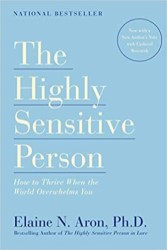
This is a ground-breaking book by Dr. Elaine Aron. Being a highly sensitive person herself and a clinical psychologist, she provides detailed understanding on how to recognise this trait in yourself and use it to your advantage.
In this book you will discover:
- Self-assessment tests to identify your specific sensitivities
- Ways you can re-evaluate your past experiences in a positive light
- Understanding and awareness on how high sensitivity affects relationships both personal and at work place
- Guidelines on how you can deal with over-arousal
- Information on medications available and when is the right time to seek help
Suffering from anxiety does not necessarily mean you are a Highly Sensitive Person, as well as people who are Highly Sensitive are not always anxiety sufferers. However, there is a lot of overlap. There is a high chance that a Highly Sensitive Person will be overwhelmed and feel anxious in social situations. Therefore it is vital to understand oneself and identify if there is a need to treat common anxiety or to effectively balance your life to avoid getting too overwhelmed.
5. Feeling Good: The New Mood Therapy by David D. Burns
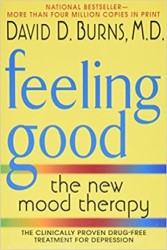
Just as the title states, the book is all about “feeling good”. Dr Burns has written a great anxiety book by providing tools for controlling anxiety. He explains exactly how to use cognitive therapy techniques to be free from negative thoughts and reduce depression. One can say with confidence that Dr. Burns has done a great job writing the best substitute to a real therapist. Feeling good is a comprehensive book and is filled with exercises for the reader to engage in, you can probably compare this book to 3 months with a CBT therapist.
In the present time it is extremely easy to let feelings like low self-esteem, anxiety, pessimist thinking and guilt keep us down and make us feel sad and lonely. Feeling Good: The New Mood Therapy, one of the anxiety books best sellers outlines several ways to handle these negative emotions.
The book communicates to its readers on:
- How to constantly feel good every day
- Ways on how you can deal with guilt
- The reasons for mood swings and how one can address them
- Learning to tackle negative emotions
- Approaches to take to build self-esteem
- Effective ways you can manage criticism and unfriendliness of others
6. The Anxiety Toolkit: Strategies for Fine-Tuning Your Mind and Moving Past Your Stuck Points by Alice Boyes PhD
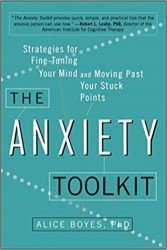
Do you frequently end up over analysing situations? Constantly worrying and only picture the worst imaginable outcome? Are highly self-critical and consider yourself a failure for anything you do that’s a little less than perfect? If any of the above situations resonate with you, you are most likely suffering from certain level of anxiety. Though decreasing your anxiety level to zero is not possible, what The Anxiety Toolkit can teach you is how to effectively manage these symptoms.
Dr. Alice Boyes has successfully interpreted evidence based tools from therapy clinic into techniques and tips you can apply in your daily lives. She has written an interactive book which provides an in depth detail on the causes of anxiety and clear steps to take to decrease this significantly. What makes this book stand out is that it inspires you to follow-through and action whatever you have learned.
7. Getting Over OCD, Second Edition: A 10-Step Workbook for Taking Back Your Life (The Guilford Self-Help Workbook Series) by Jonathan S. Abramowitz
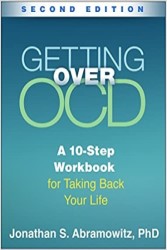
According to ADAA, obsessive compulsive disorder (OCD) impacts 2.2 million adults, or 1.0% of the U.S. population. If you are one of them then this book can be an effective tool for you. Getting Over OCD comes highly recommended as the author, a leading OCD specialist, Jonathan S. Abramowitz has innovatively presented powerful approaches and techniques that you won’t get from other OCD books. He has made the process simpler by spending an appropriate amount of time in assisting the readers to improve their thought process first before leaping into changing habits.
The workbook is comprehensively updated and based on cognitive-behavioral therapy (CBT) which is an effective treatment of this anxiety disorder. The workbook Getting Over OCD will assist you in:
- Understanding just how OCD affects your body and mind
- Overcoming obsessional thoughts and compulsive behaviours
- Finding relief from your intrusive thoughts
- Getting rid of compulsive rituals
- Mitigating anxiety and enhancing your relationships
- Developing a tailored plan for change
8. Full Catastrophe Living (Revised Edition): Using the Wisdom of Your Body and Mind to Face Stress, Pain, and Illness by Jon Kabat-Zinn and Thich Nhat Hanh
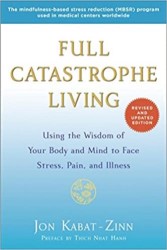
Based on Jon Kabat-Zinn’s well-known mindfulness-based stress reduction program, this book has breakthrough work on mindfulness, meditation, and healing. Full catastrophe living demonstrations ways you can use medically proven mind-body techniques from meditation and yoga to alleviate stress and form better balance of body and mind. By incorporating these mindfulness practices in your life, you can learn to manage lasting pain from illness and stress-related disorders, significantly decrease anxiety and feelings of panic, and advance the overall quality of your life and relationships.
Stress is all around us and more often than not it gets inside us, drains our energy, deteriorates our health, and makes us susceptible to anxiety and depression. This book is suitable for both young and the mature or any person wanting to live a better and stable life in the present time.
9. Rewire Your Anxious Brain: How to Use the Neuroscience of Fear to End Anxiety, Panic, and Worry by Catherine M. Pittman & Elizabeth M. Karle
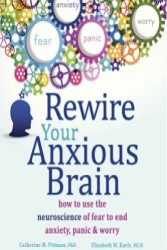
Psychologist Catherine Pittman and author Elizabeth Karle have provided a remarkable, evidence-based solution to overcoming anxiety. This book takes a close look at the brain, exploring the two sections of the brain called amygdala and cortex. The purpose of explaining how these areas in the brain work is to provide the readers with power to be able to change the way they respond when they encounter anxiety, worry, panic or fear.
Anxiety begins in the brain, not the situation
Some of the learnings from Rewire Your Anxious Brain include:
- Reasons why you sometimes cannot think when anxiety, panic or fear take over
- How to get past a panic attack quicker
- Ways in which your past affects your anxiety in the present
- How any object can end up producing fear in someone
- Triggers and how they impact your anxiety, worry, fear or panic
This book will provide a greater understanding of how anxiety is created in the brain, therefore as a result, you will feel motivated to overcome it.
Final Thoughts
While the above listed anxiety books best sellers will assist you in understanding anxiety disorders and its coping mechanisms, you may still be wondering if these will actually help you with your anxiety? The answer to this really depends on the fact if you are reading a book with expectation of being “fixed” by merely reading it or you intend to action the learnings. Therefore yes, these books are beneficial as a starting point as it will give you perspective on what your anxiety is and where it comes from. These books will make the work a little easier, but you still have to do the work.
